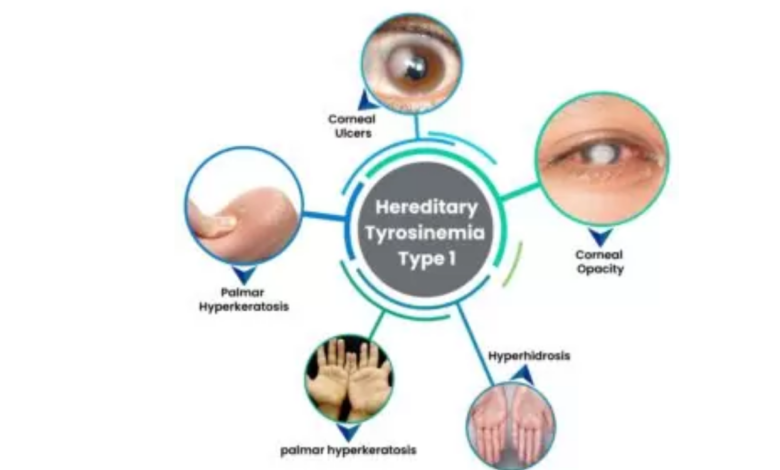Tyrosinemia: A metabolic disorder affecting the metabolism of amino acids.

What is the Tyrosinemia ?
Tyrosinemia is a rare genetic disorder that affects the way the body breaks down an amino acid called tyrosine. When tyrosine builds up in the blood, it can cause serious health problems.
What are the symptom of Tyrosinemia?
Symptoms of tyrosinemia vary depending on the type of the disorder, but they often include:
- Vomiting: Frequent and severe vomiting.
- Jaundice: Yellowing of the skin and eyes.
- Liver problems: Enlarged liver, liver failure.
- Skin rash: A rash on the hands and feet.
- Intellectual disability: Delayed development and cognitive impairment.
- Kidney problems: Kidney stones or kidney failure.
- Corneal clouding: A cloudy film over the cornea of the eye.
Who can suffer from Tyrosinemia?
Tyrosinemia is a genetic disorder that can affect anyone, regardless of age, gender, or race. It is often inherited from parents.
What are the type of Tyrosinemia?
There are three main types of tyrosinemia:
- Type I: The most common type, characterized by an inability to break down tyrosine completely.
- Type II: A less common type, characterized by an inability to convert tyrosine into another amino acid.
- Type III: The rarest type, characterized by an inability to break down a specific intermediate compound in the tyrosine breakdown pathway.
Which diagnostic are available for the Tyrosinemia ?
· Blood tests: To measure levels of tyrosine and other amino acids in the blood.
· Urine tests: To detect the presence of abnormal metabolites in the urine.
· Genetic testing: To confirm the diagnosis and identify the specific genetic mutation.
What are the treatment of the Tyrosinemia ?
Treatment for tyrosinemia involves a strict diet that restricts the intake of tyrosine. This diet may require special foods or supplements. In some cases, medication may be necessary to help control the buildup of tyrosine in the blood.
Which diet should I take ,if any ?
A strict tyrosine-restricted diet is essential for managing tyrosinemia. This diet may require the guidance of a registered dietitian.
Which speciality of the doctor will Tyrosinemia?
A pediatrician or a metabolic specialist is typically involved in the diagnosis and treatment of tyrosinemia.
In Tyrosinemia completely curable ?
While there is no cure for tyrosinemia, with proper management, individuals with the condition can lead normal and healthy lives. Adhering to a strict diet and seeking regular medical care are crucial for managing the disorder.





